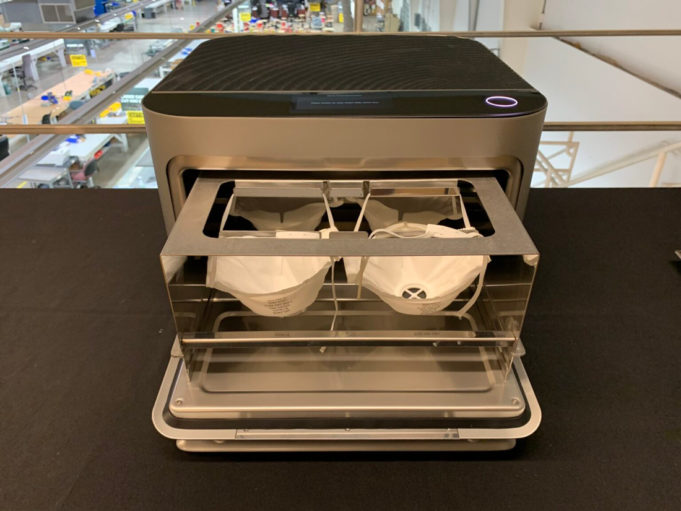As the coronavirus crisis was ramping up in mid-March, John Tepper remembered watching the news from his Carrollton home and wondering how hospitals were going to handle sanitizing hundreds of masks per day. The entrepreneur and medical device development consultant knew that the highly infectious COVID-19 was going to force medical workers to burn through personal protective equipment (PPE) at unprecedented levels.
“The news was already talking about the shortage of PPE, especially with masks,” Tepper recalled.
Tepper had just finished developing a device that decontaminates dermatological instruments. Surely, he thought, someone is working on something similar that can use UltraViolet Germicidal Radiation (UVGI) to decontaminate and sanitize masks. Tepper realized that what hospitals, cities, and other groups really needed was a portable, easy-to-use device that could kill pathogens on N95 respirators (the mask of choice for many medical professionals) and other medical masks.
He bounced the idea off his friend and frequent business partner Ab DeWeese, who is also a physicist. When an online search found that no such products existed, DeWeese and Tepper brought on two additional business partners, Tim Hissam and Rusty Rose, and formed Hepius Equipment. The team worked quickly to develop a prototype that was the size of a small office printer.
DeWeese and Tepper have extensive experience in developing and testing medical devices. After our online meeting, DeWeese sent me a slew of links from the Centers for Disease Control and Prevention (CDC), National Institutes of Health, and scholarly journals that basically described UVGI’s singular effectiveness at obliterating the RNA that allows the novel coronavirus to wreak havoc in the bodies of hosts.
Within two weeks of forming Hepius Equipment, the team had a working prototype that caught the interest of administrators at Parkland Memorial Hospital in Dallas. The Parkland staffers recommended a few modifications that were quickly completed. The initial N9500 order was delivered to Parkland last week, Tepper said. The N9500 has a minimum setting of one minute of UVGI radiation emission. The device is powered by a standard electric cord.
“Hepius equipment worked with our Infectious Disease team at Parkland Hospital,” Parkland said in a statement. “The N9500 met our rigorous requirements on the first try. Parkland Hospital loves the N9500.”
DeWeese and his team work with potential clients, often in consultation with the purchasing group’s medical director, to decide what the ideal setting should be. For Parkland’s purposes, seven minutes of UVGI radiation emission was ideal, Tepper said.
Some large hospitals may have centralized decontamination capability, but those dedicated operations are labor-intensive, and many nurses and doctors would prefer to know that their personal mask is returned and not accidentally switched with someone else’s, DeWeese said.
The barely month-old business is in talks with Fort Worth economic developer Robert Sturns, DeWeese added. Mobile testing sites, police stations, fire stations, Tarrant County Jail, and Fort Worth hospitals are all potential clients for the $8,599 device.
Through a succession of executive orders issued by Gov. Greg Abbott, Texans are in the process of reopening businesses and public spaces. Reopening stores and offices will mean providing masks to employees who may have little to no knowledge on how to properly handle the PPE, DeWeese said.
“As we launch in the great reopening, hopefully, we don’t have to do it a second time” if people are properly using masks and other PPE, DeWeese said.
Tepper said that Hepius Equipment is just one of the thousands or possibly tens of thousands of small businesses in the United States that have thrown all of their resources into tackling a specific problem posed by the novel coronavirus.
“Most of us have been part of large companies,” Tepper said. “They have a lot of resources, but they also have to be accountable to owners and stockholders. If you have a great idea, you have to pitch the idea from management up to the board of directors to get resources. Small businesses can be much more agile. I called Ab, and by the end of the week, we had Tim and Rusty onboard and a prototype within two to three weeks. We can’t do everything, but we think we can do this one thing really well and really quickly.” — Edward Brown












